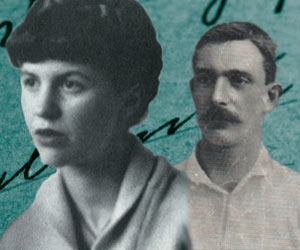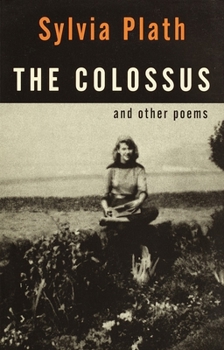The Colossus: And Other Poems
(Book #3 in the Childhood, Boyhood, Youth Series)
Select Format
Select Condition 
Book Overview
With this startling, exhilarating book of poems, which was first published in 1960, Sylvia Plath burst into literature with spectacular force. - " Her poems] have that exquisite, heart-breaking quality about them that has made Sylvia Plath our acknowledged Queen of Sorrows." --Joyce Carol Oates, The New York Times
In such classics as "The Beekeeper's Daughter," "The Disquieting Muses," "I Want, I Want," and "Full Fathom Five," she writes about sows and skeletons, fathers and suicides, about the noisy imperatives of life and the chilly hunger for death. Graceful in their craftsmanship, wonderfully original in their imagery, and presenting layer after layer of meaning, the forty poems in The Colossus are early artifacts of genius that still possess the power to move, delight, and shock.
In such classics as "The Beekeeper's Daughter," "The Disquieting Muses," "I Want, I Want," and "Full Fathom Five," she writes about sows and skeletons, fathers and suicides, about the noisy imperatives of life and the chilly hunger for death. Graceful in their craftsmanship, wonderfully original in their imagery, and presenting layer after layer of meaning, the forty poems in The Colossus are early artifacts of genius that still possess the power to move, delight, and shock.
Format:Paperback
Language:English
ISBN:0375704469
ISBN13:9780375704468
Release Date:May 1998
Publisher:Vintage
Length:96 Pages
Weight:0.26 lbs.
Dimensions:0.3" x 5.1" x 7.8"
Customer Reviews
5 ratings
Genius' Magnet
Published by Thriftbooks.com User , 16 years ago
"Compelled by calamity's magnet/They loiter and stare" begins the poem "Aftermath" by Sylvia Plath in "The Colossus." In this striking collection of living language, Plath gives us a hearty portion of her verbose verse. "The Colossus and Other Poems" was written when Plath was heavy on the thesaurus, and it shows. These poems are so rife with description that one feels the need to read them several times over. Compared to Ariel, "The Colossus" is meticulous, planned, deliberate. While "Ariel" sparks lingual clusters of abstraction into the brain of the reader, the poems in this collection are deciphered with relative ease. Though gorgeously crafted, the poems are, mostly, straightforward. Of course, Plath's characteristic grimness is not lost in her more formal work here. Throughout "Colossus" we see glimmers of the darkness that defined her later work. And, as with most of Plath's poetry, the macabre is often moot compared to the dazzling language and visual strength of her writing. "The Colossus and Other Poems" is a diverse, magnificent collection. From Plath's native New England to mushrooms and sows to "The Colossus" itself, Plath weaved a masterful tapestry of words. We can't help but "loiter and stare."
Unacknowledged Classic
Published by Thriftbooks.com User , 18 years ago
Not Plaths's most famous book, obviously, but quite arguably her best, Colossus is cool and totally controlled. Here Plath finally refines what she had started doing from teenhood -- please consult the juvenelia in Collected Poems to confirm this. Images of distant objectivity are chosen as pivots for the most intimate meditations, physical and personal. The "I" is often seen as if under a microscope, to a degree beyond what was earlier achieved by her tutor confessional poets such as Robert Lowell. Indeed this may eventually be seen as her lasting poetic achievement -- carrying the confessional theory quickly to its absolute brink -- and this book is where it finally breaks the surface of the water successfully. Painfully, Plath -- an almost merciless keeper of diaries, journals, and notes -- records here the exact incident of her transformation -- in "The Eye Mote." Perhaps lacking the drama of later poems, it is all the more revealing, heavily sad, doubtless true. And the incident (perhaps half-imagined, half real) has nothing of the cultural or personal overlays one finds in 95% of the Plath literature, pro and con. It has a lot more to do with the theory and practice of confessional poetry itself -- its breath-taking possibilities and vast opportunities for a dreadful slip from its tightrope act.
A Great Collection of Poetry!!!!
Published by Thriftbooks.com User , 20 years ago
A Great Books for frans of poetry and Sylvia Plath. Best Poems are ones at the beggining and end of her literary career. This is the beggining and one of the best. If you like this, Also look at her last collection of poems, "Ariel" Thanx for your time!!!!!!
Achieving Harmony through Conflict: Plath's Word-Sculptures
Published by Thriftbooks.com User , 23 years ago
Sylvia Plath's initial volume of poetry is very much in the formalistic style that was prevalent in the 1950s, but she brings to verse-making a "diction that is galvanized against inertia" (to quote Marianne Moore in a different context), a heavily alliterative, percussive idiom in which we discern kinship to Dylan Thomas and Gerard Manley Hopkins.In "Hardcastle Crags," we have an analogue for a woman's heels against the pavement: "Flintlike, her feet struck / Such a racket of echoes." We have the slovenly slush of the tide at Point Shirley, where the poet's grandmother "kept house / Against what the sluttish, rutted sea could do." We have in other slant-rhymed terza-rima, and intricate stanza shapes reminiscent of Richard Wilbur and his lyric called "Beasts."And has anyone captured the somnolent wakefulness of "the chilly no-man's-land of five o'clock in the morning" better than Sylvia Plath in "The Ghost's Leavetaking"?There are poems about mushrooms, moles, and men in black. There is a homage to the artist Leonard Baskin, renowned as a maker of woodcuts. A keen visual sense in these poems leads us not to be surprised when we learn that Plath worked well as a painter of watercolours.Her second pre-posthumous volume, "Ariel," is perhaps more famous for its unselfsparing chronicle of a crashing marriage and of suicidal depression. Its fiercely unfettered cadences and controversial images attracted immediate attention, praise and opprobrium. But this reviewer feels that the poems of "Colossus" represent the superior achievement, possessing a technique and a sonic command surpassed by precious few poets of our age.
stark and sublime, plath's hommage to her father.
Published by Thriftbooks.com User , 25 years ago
poetry is long becoming a lost art, plath keeps it alive with deep emotion and intense language. one could spend years reading this collection over and over.
The Colossus and Other Poems Mentions in Our Blog

Sylvia and Ted: Their Troubled Romance
Published by Ashly Moore Sheldon • February 26, 2021
Sixty-five years ago today, Sylvia Plath and Ted Hughes met at a party in Cambridge. Their connection was immediate, powerful, and violent—a portent of their future together. Almost exactly seven years later Plath would die by suicide.






